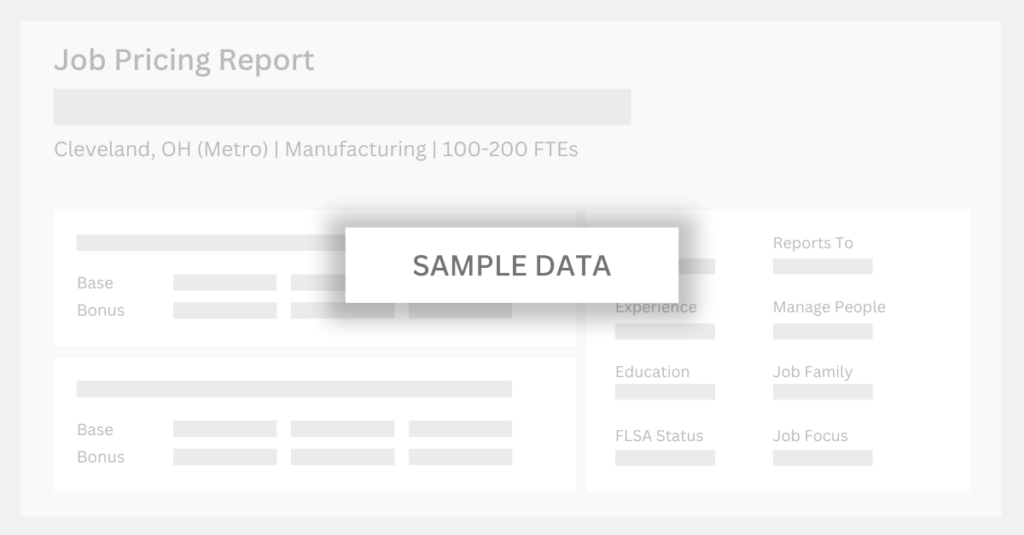Compensation Data for an Operations Supervisor in Ohio

Compensation data breakouts:
- Location (example: Cleveland, Akron, Ohio, National)
- Company Size (number of full-time employees)
- Industry (industry-specific or all industries)
- Years of Experience
- Education
Data included in each report:
- Base Compensation (Salary or Wage)
- Total Compensation
- Bonus
- Long-term Incentives
- Job Description
- Competencies/Skills
Get a Free Sample Report
Submit the form below to receive a sample job pricing report or to access ERC’s compensation data.

ERC is a leading provider of compensation data
Whether you’re actively recruiting and hiring or trying to stay competitive, having local salary and wage data is critical. ERC members gain access to compensation reports, job description research, and an HR Help Desk for compensation and workplace practices data.
Job Description
Overview
- Supervises the operating activities of an organization, branch, plant, or department.
- Provides input on the development and implementation of organization’s policies, practices, procedures, and attainment of operating goals.
- Oversees and coordinates activities of subordinate operations staff.
Typical Functions
- Interprets company policies to workers and enforces company policy and practices.
- Establishes or adjusts work procedures to meet schedules.
- Recommends measures to improve methods, performance, and quality of product or services, and suggests changes in working conditions to increase efficiency.
- Analyzes and resolves work problems, or assists employees in solving work problems.
- Initiates or suggests plans to motivate workers to achieve work goals.
- Prepares reports and records on department activities for management.
- Recommends or initiates personnel actions, such as promotions, transfers, discharges, and disciplinary measures.
- May train new workers.
Similar Positions
There are several positions that share similar responsibilities to an Operations Supervisor, including:
- Operations Manager
- Warehouse Supervisor
- Production Supervisor
- Shift Supervisor
- Team Leader
- Plant Supervisor
- Operations Coordinator
- Facilities Supervisor
- Logistics Supervisor
Experience and Education
An Operations Supervisor typically needs a combination of education, experience, and skills to excel in their role. While a bachelor’s degree in business administration, operations management, or a related field can be beneficial, practical experience in operations, logistics, or a similar field is highly valuable. This experience can be gained through progressively responsible roles in operations or supervisory positions.
Operations Supervisors should have a strong understanding of operational processes, procedures, and best practices, as well as experience in coordinating and managing teams to achieve operational goals. They should possess strong leadership and communication skills to effectively guide and motivate staff, resolve issues, and foster a positive work environment.
Additionally, knowledge of relevant industry regulations, quality control measures, and experience with operational software and systems are important for ensuring smooth operations and driving continuous improvement. Adaptability, problem-solving abilities, and the ability to work well under pressure are also crucial traits for success in this role.
Competencies and Skills
- Leadership
- Communication
- Operations management
- Problem-solving
- Organization and planning
- Team management
- Quality control
- Process improvement
- Data analysis
- Technical aptitude
- Health and safety compliance
Why ERC Compensation Data?
Through frequent polls and surveys, ERC offers a comprehensive collection of recent, reliable data covering workplace practices, employee compensation, benefits, wages, and salaries from local, regional, and national samples.
While “free” compensation data can be found on the web, here’s why you should be cautious:
- Validity — Often “free” salary data is collected from anyone willing to participate or share information. This means you don’t have a good sense of how big the sample size is, the geography of the data, or the type or size of organizations from which the data is being collected.
- Recency — ERC’s survey data relies on regular and consistent participation to ensure that the data is recent, while “free” pay data sources may provide data that is many years old.

